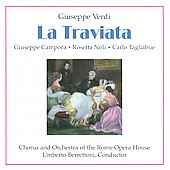I’d never heard of this recording or conductor–yet even knowing that the 1950s-era Remington Opera Series, of which this is a part, tended to be low-budget and perfunctory, I decided to give it a whirl. Rosetta Noli was born in 1926 and had a fine career in Italy and France, straddling Italian (Nedda, Desdemona, Mimi) and French (Micaela, Manon) repertoire. I bet bumping into her during the ’50s in a provincial Italian opera house would have been a memorable experience (she was invariably the third or fourth cast at Scala, Naples, etc). On recordings she’s a sincere, wounded Violetta, with a somewhat edgy sound, respectable coloratura, far less weight than needed for the part, and a nicely musical bent. No particular moment stands out.
Giuseppe Campora was a fine tenor who made some major recordings and sang at the Met for seven seasons in 90 performances. Here he’s a fine Alfredo, a truly good partner–also without any special moments. Carlo Tagliabue, known for his big-voiced work on the Cetra label, is a stylish Germont, and despite already being 56 years old, he impresses vocally. But he walks through “Di Provenza” without much heart.
Conductor Umberto Berrettoni has true Italian blood, but he’s low on passion. Each “star” is reliable, little more. There are odd cuts and at times the orchestra is so sloppy that it seems as if the players are sight-reading. In short, this sounds like it was done on the run, and the recording–cold, boxy mono–is awful. The extra arias and duets have the same dreadful ambiance and lack all spontaneity, but Noli is a better-than-I-would- have-guessed Butterfly, Mimi, and Marguerite, with Campora a good partner in the first two. Everyone has a high C and none of them thrill. Don’t worry about this release.
































